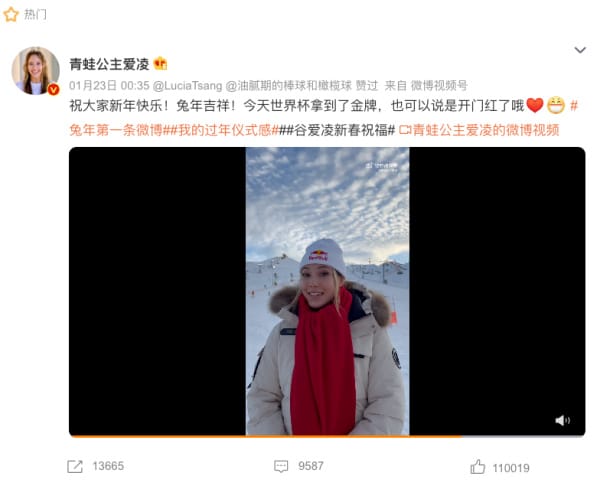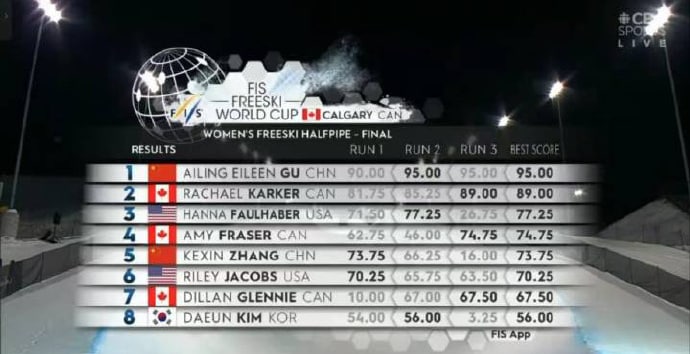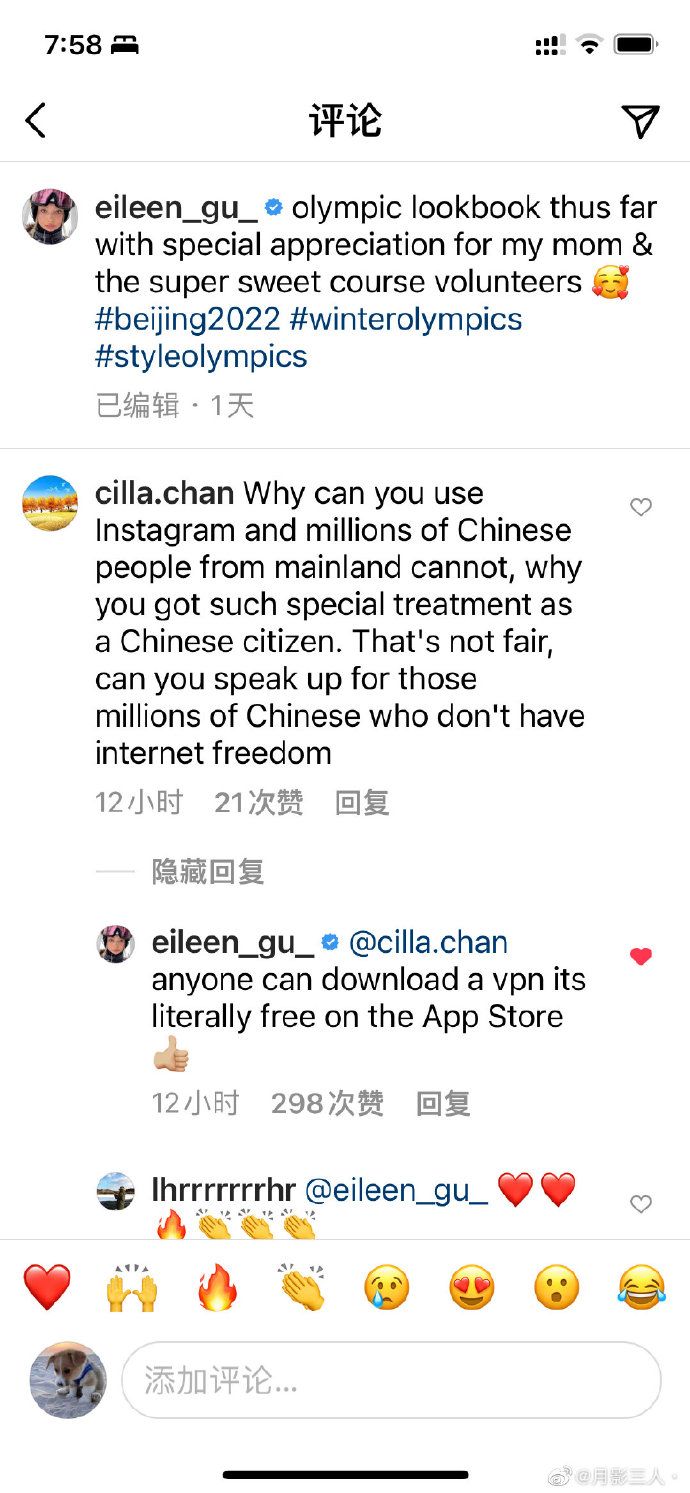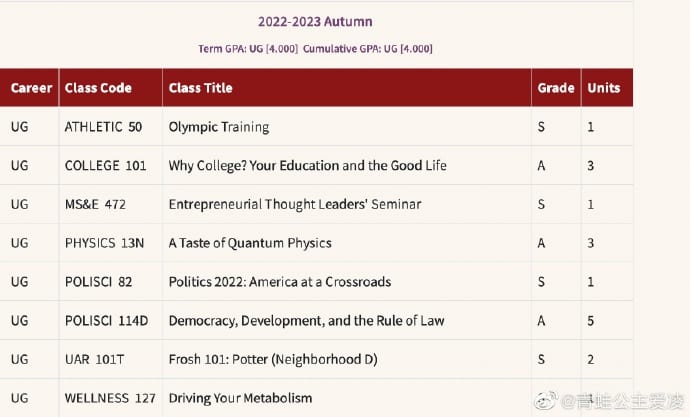This Chinese Lunar New Year, the three Chinese Winter Olympic athletes Wu Dajing, Xu Mengtao, and Gao Tingyu, were widely discussed on Chinese social media after their debut at the CGM Spring Festival Gala.
Over 8000 kilometers away, another Winter Olympic athlete, Eileen Gu – better known as Gu Ailing 谷爱凌 in China, – also garnered huge attention for her excellent performance at the Calgary halfpipe World Cup. Just as people were celebrating the Chinese New Year, Eileen Gu claimed her second gold medal at the FIS Freeski World Cup.
It has almost been a year since the then-18-year-old Chinese-American freestyle skier grabbed gold at the Olympics and became front-page news in China.
Although Gu already garnered attention online when she announced in June of 2019 that she would switch national affiliation and compete for China, it wasn’t until the Olympics that she appeared all over social media, was featured in dozens of ad campaigns, and practically became a household name in China.
Now, in light of the FIS Snowboard World Cup and the X Games in Aspen, Gu is back in the limelight.
On January 21st, the first day of the Year of the Rabbit, Chinese state broadcaster CCTV celebrated Gu’s victory on social media using the hashtag “Eileen Gu Claims Two Golds within Three Days during the New Year Celebrations” (#谷爱凌过年3天2金#), with a two- minute video clip recording the highlights of her recent race. The hashtag has since received over 180 million views.
Gu herself also shared her victory on Weibo and wished people a prosperous New Year. That post attracted over 110,000 likes.

Many Chinese people celebrated Gu’s new achievements with words of admiration, praising her capabilities and determination. One Weibo user commented: “I have to say, Gu Ailing is truly excellent. Three days, two medals. She has an indisputable talent.”
Another user posted a video of Gu practicing while waiting for her flight and commented: “A healthy, energetic, diligent, excellent Gu Ailing who even continues training while waiting for boarding. Success doesn’t come overnight.”
Others also view Gu as a national icon for her gold medal wins for China. The phrase “wèi guó zhēngguāng” (“为国争光”), “winning glory for the country,” appeared in many posts under the hashtag related to Gu’s win.
But over the past year, since Gu’s Olympic success, she has not always merely been viewed as a patriotic hero. Despite her popularity, Gu also triggered controversy and sometimes came under fire, with some wondering if she truly was patriotic and others blaming her for being privileged.
PATRIOTIC
“Everybody knows Eileen Gu is Chinese”
During the 2022 Winter Olympics in Beijing, the fact that Gu had switched her international allegiance and represented China instead of the US instilled pride among many Chinese. Chinese media flooded with stories on Gu that focused on the narrative of the multi-talented “mixed kid” who gave up her United States citizenship to represent the People’s Republic of China.
However, when being asked about her citizenship in interviews, Gu’s replies left many people wondering about the facts of the matter; they wanted to know whether or not Gu actually gave up her American passport, as China does not recognize dual nationality. Gu’s response “I’m American when in the US and Chinese when in China” triggered dissatisfaction among Chinese audiences.
“I have stopped liking her since she said that,” one Weibo user reflected in December 2022, and the post received 35,000 likes. To this day, there are many social media comments bringing up Gu’s comment: “You’re in America, so now you’re American, right?”
Others also attacked Gu after Forbes listed her as the third highest-paid female athlete in the world in 2022 (#谷爱凌年收入1.4亿#). Some commenters argued that she had earned her money in China and was spending it in the US, and that she was unpatriotic for doing so.
However, some netizens defended Gu by stressing what she had done for China. In Weibo posts and comment threads, users supporting Gu wrote: “She won two gold medals and more for China, what did your patriotism contribute to China?” Others also said Gu had shown her love for China through her performances, and that it would be impossible to expect her to distance herself from the country she grew up in.
Meanwhile, Western media outlets described how the bi-lingual Gu had been “dodging” explicit questions about her US citizenship status. This also led to Gu getting attacked by Americans. When Gu returned to the US and enrolled in Stanford University, there was even an online petition about getting Gu’s admittance to Stanford revoked due to Gu’s supposed “lack of integrity about her nationality” and indifference to “the human rights violations” in China.
Among Chinese netizens, questions also rose about whether Gu had only represented China during the Olympics and if her return to the US might mean that she would give up her Chinese nationality and play for the US team instead.
But with Gu’s debut at the FIS Freeski World Cup in the Year of the Rabbit, Chinese bloggers pointed out that Gu’s nationality was still listed as Chinese.

“No matter where she is, Gu Ailing still has the Chinese nationality,” one Weibo blogger wrote, with others also saying: “She is still representing China, we should all support her! The rumors about her changing nationalities are false!”
“Everybody knows Eileen Gu is Chinese,” another social media user wrote.
But not everybody is convinced: “Don’t fool yourself. I’m happy she helped China win gold, but dual citizenship is dual citizenship, there’s no point in covering it up.”
PRIVILEGED
“Gu’s success is unrelated to normal people”
Another discussion that has flared up during Eileen Gu’s past year of success is focused on her alleged privileged status, especially within the context of her being praised as a role model for Chinese (female) younger generations.
In February of 2022, an Instagram comment made by Gu regarding the use of VPNs in China caused some controversy. At the time, one person asked Gu about “internet freedom” in China and how it was possible for her to use Instagram while she was in China, where the platform is blocked. Gu then replied: “Anyone can download a vpn its literally free on the App Store [thumbs up]”

A screenshot of the exchange then circulated on Weibo, where many netizens were surprised about Gu’s statement. VPNs are generally not available on app stores in mainland China, as there are numerous restrictions on virtual private networks (VPNs) which are commonly used to browse websites or apps that are otherwise blocked in China.
Gu was then criticized over the fact that she seemed unaware of the restrictions on VPNs along with her suggestion that ‘internet freedom’ only referred to the accessibility of foreign platforms, allegedly showing her privileged position.
After Gu enrolled in Stanford University and posted her all-A transcript of the first semester at the end of 2022, many praised her hard work but there was also criticism about her “showing off” and strategically choosing a supposedly easier curriculum.
“She posted it to impress Chinese people who do not understand the system,” one person commented, with others replying that an “S” grade does not equal full points and that she had no A+ grades. Others claimed that Gu probably received help with her schoolwork.

Gu’s Weibo post at the end of 2022 reviewing her achievement of the year, including her transcript of the first semester at Stanford University.
As online discussions intensified (#谷爱凌斯坦福所有课程全部满分#), Gu herself responded to online criticism, stressing that she – without anybody’s help – had worked hard for her grades and that only 5% of students can get an A at Stanford.
The idea that Gu comes from a very privileged background and that it is not just her diligence that brought her success is a recurring one on social media.
Gu was raised by her Chinese mother, a molecular biology graduate who studied at Peking University and Stanford University and who used to be a speed skating athlete as well as a part-time coach at Peking University. She allegedly worked at Wall Street and later became a CEO of a risk investment company. Her grandmother, a former official at China’s Ministry of Transport, was a university basketball player, while her grandfather was a soccer player at school who was also good at swimming, skiing, and skating. Her family members’ background is exceptional. University students were rare among Gu’s grandparents’ generation, and studying abroad was also uncommon for her mother’s generation.
As people believe that this family background has largely contributed to Gu’s success, Gu’s position as a “role model” is questioned.
“Gu’s success is unrelated to normal people,” one Weibo user wrote. “What is the meaning of having this kind of role model? I have no parents from the Ivy League, no pretty face of mixed race, no elite education from the mix of Chinese and American cultures, no exceptional family background, and even no talent,” one Zhihu user wrote.
“Gu started skiing at three years old, and practiced running, basketball, piano, and ballet soon after; I started playing in the mud at three years old and I can still only play in the mud,” another user wrote. “Gu’s mother meticulously planned Gu’s life, but my mother could hardly spare any time for me while she was working.”
PERFECT
“Congratulations, Little Gu, you’re the greatest!”
Amid all the online discussions surrounding Eileen Gu, there is the view that people have not necessarily grown tired of Gu herself but of the (online) media narratives surrounding her which present her as the perfect daughter, the perfect athlete, or the perfect role model.
Some people admit that they feel jealous or say that they feel it is unfair because they feel they could never reach that standard.
One article published by The Paper in 2022 reiterated the popular view that Gu’s success “has nothing to do with ordinary people” (“谷爱凌的成功与普通人没啥关系”), but argued that people should draw inspiration from her story rather than focusing on all the aspects of her life that are unattainable to them.
A commentary by PLA Daily also argued that Olympic athletes should not be turned into “gods” for their overnight success; neither should they be vilified because of their shortcomings. It’s not about the pursuit of perfection, the author wrote, but about facing up to one’s own shortcomings.
There are also those who remind others that Gu is still a teenager. Not only have some of the controversies over the past year shown that Gu is not “perfect,” they also showed that fame is a double-edged sword.
As one netizen put it: “Success can be magnified to an extreme, and mistakes can be enlarged without boundaries (..) She’ll be carefully walking on the sharp edge of the sword because if she does something that does not conform to what people expect of her, the same people who praise you today will step on you tomorrow.”
Meanwhile, many Chinese fans of Eileen Gu have had it with those leaving “sour comments.” “She is representing China, she snatched gold, your empty ‘patriotism’ is contributing nothing!”
“Congratulations, Little Gu, you’re the greatest!” some say: “You did a good job, and we’re proud of you.”
By Zilan Qian and Manya Koetse
Follow @WhatsOnWeibo
Get the story behind the hashtag. Subscribe to What’s on Weibo here to receive our newsletter and get unlimited access to all of our articles:
Spotted a mistake or want to add something? Please let us know in comments below or email us. First-time commenters, please be patient – we will have to manually approve your comment before it appears.
©2023 Whatsonweibo. All rights reserved. Do not reproduce our content without permission – you can contact us at info@whatsonweibo.com.
The post Gu’s Year: How Eileen Gu Became a Beloved Icon and Controversial Role Model in China appeared first on What's on Weibo.